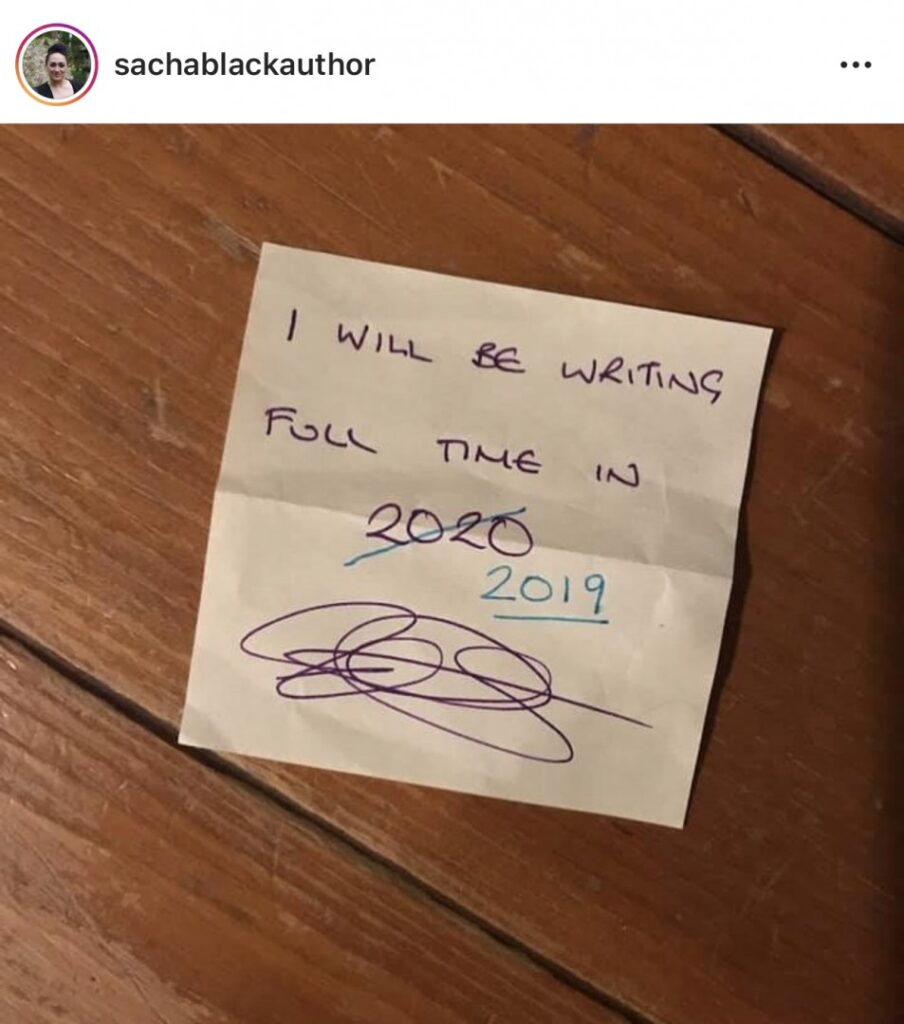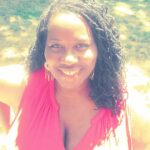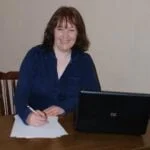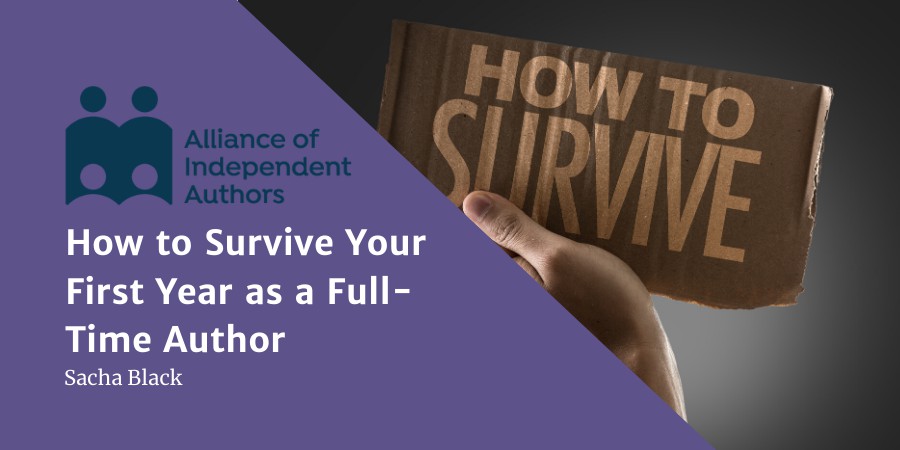Quitting your day job to write full-time is a huge achievement. But what happens when you walk away from a salary? How do you survive your first year? Alliance of Independent Authors blog manager, Sacha Black is approaching her one year anniversary and is here to share both the lessons she learned in her first year of full-time writing as well as the lessons some of our members learned. Learn how to survive your first year as a full-time author.
These weekly advice posts draw on the group wisdom and experience of the advisors and members of the Alliance of Independent Authors (ALLi). Our thanks to all who shared whether through discussions in our member forums or more formally in submission and presentations. For this post, special thanks to Holly Lyne, Alison Jack, Helen Baggott, Joanna Penn, Grace Wynter, Debbie Young for their contributions and the lessons they learned during their first year.

Sacha Black, ALLi blog manager
I spent a long time thinking I'd never be able to leave my job, so it's a bizarre feeling to sit here and write a post about my one year anniversary having done just that.
For a long time I carried a Post-it in my wallet. An affirmation of sorts, one I looked at multiple times a day. Every time I bought a coffee or paid for something I'd see the note and run the words through my head like a mantra. It helped keep me going when times were dark and the desperation to leave the day job was strong.
Originally, I thought I'd leave work this year: 2020. Instead, I left last year and 2020 actually sees me celebrating my one year anniversary instead.

This post is about my reflections and takeaways as I look back at the last year. I hope it will help those of you who are still in the day job or moving towards transition.
How to Survive Your First Year as a Full-Time Author: Say yes until you have to say no
When I first left work, I was terrified—almost to the point of paralysis. What if I couldn't pay my bills? What if I couldn't put food on the table? So I took on freelance work (and a lot of it). Unfortunately, that led me to the point of burn out because I was still trying to do all the things for my business too. I ended up extremely tired and in a position where I'd spent most of the time I'd worked on things for others instead of writing and creating products I could sell.
This was a gift and a curse. It enabled me to grow in confidence. Over time, I realized I could survive just fine without all that freelance work; no one was going to go hungry. But if I was going to make this work, then I needed to refocus my time on creating things that would last.
Learning to say no to quick cash is a tough one. There's a mindset shift required; you have to value yourself, your work and your ability to make things that generate income. That takes time.
Takeaway 1: When you first leave your job, having a mix of freelance and passive income is good for reassurance and buys you time to grow your confidence.
Takeaway 1B: Learning to say no is tough but keep your end goals in mind. If you want a long term business, you need to prioritize your work, not others'.
How to Survive Your First Year as a Full-Time Author: you can't work 24 hours a day
Transition is brutal. You go from a day structure that effectively 90% of society follows to no rules, no boss, no expectations. You're on your own, which means you get to make your own schedule too. And then suddenly you get to do the thing you love more than anything ALL.DAY.LONG. The temptation to just continue working all day and all evening is strong!
Worse, there are no boundaries. Work is home is work. My office is in my house so the lines of separation are blurred to say the least. Even though I'd happily work 24 hours a day, my body conks out and my family eventually strop—and rightly so.
The lesson here is that eventually, despite my best intentions to work until my eyes bleed and pieces of my body fall off, I simply can't. This is a work in progress. Getting the right balance is something I'll probably always struggle with. I'm an out and proud workaholic. I love what I do, and I have big goals to achieve.
Takeaway 2: Balance is hard to achieve, experiment. And if your family tells you you're working too hard, don't get mad, just listen. They're probably right.
How to Survive Your First Year as a Full-Time Author: the leaps of faith don't stop with ‘I quit'
For a while, I thought the only leap of faith I’d have to make was leaving my day job. Oh, Sacha. Dear sweet, naïve Sacha… In the words of Ygritte, “You know nothing, Jon Snow.” If one thing is totally clear, it’s that working for yourself is a continual ‘schooling'.
Yes, that fateful ‘I quit' leap was huge, probably the biggest. But there are definitely others cropping up along the way.
From trusting your gut, deciding whether to enter into a collaboration, deciding which product to create first, or whether to end a freelance relationship, the mini leaps of faith don't stop. In fact, they get more frequent. Though perhaps, as your confidence and resilience grows, each leap gets a little easier.
Takeaway 3: As brave as you had to be to say ‘I quit', be prepared to need similar levels of bravery during your first year in business.
How to Survive Your First Year as a Full-Time Author: no matter what happens, this is better
In a way a lot of this year-long journey has been about survival, just getting to the end to defeat the fear. I guess it's been a journey of empowerment.
I was in the unfortunate position of not enjoying my day job. I spent a long time struggling to stay positive because of that. And it's probably why a lot of the first year was spent shrouded in fear; fear of being broke, fear of having to go back, fear that I'd fail.
I’ve finally reached a point where I know that no matter what happens, no matter what I have to do to earn money, for me personally, this life is 100% better than anything that came before.
Leaving work really solidified what’s important in my mind. When I look back at who I was and how crippled I was, mentally, physically and emotionally, I know nothing can be that bad again. I won’t allow it.
I’m trying to practice appreciation and gratitude, even on the hard days.
Takeaway 4: no one said this was easy but it is fun. It is play. This is the best job in the world, and it's worth every rollercoaster day and every bit of blood, sweat and tears it took to get here and to where it's going.
I recommend it!
How to Survive Your First Year as a Full-Time Author: Member Lessons
Holly Lyne: focus not consumption
“…in the early days of taking it seriously as a business I binged ALL THE THINGS. I signed up for a dozen courses, most of which I’ve never completed, I tried everything. I’m only just coming out of the other side of that now. I wish I had learned to be more focused sooner.”
Debbie Young: discipline and repurposing
Debbie Young
“I wanted the discipline of having to write at least something every month, to length and to deadline, so I volunteered to write monthly columns in our two local community magazines for no pay (they are non-profit and put their surplus funds back into community causes). This was really good for practising my writing skills, and the pressures of the monthly deadline were good for my self-discipline. It had the further benefit of raising my profile as a local writer, which has led to lots of other useful local connections. After a few years I also compiled the columns into books, which added two more publications to my catalogue. As a big fish in a small pond, it was also good for my ego – the magazines' editors are always buttering me up, and one refers to me as “The jewel in the crown of the Tetbury Advertiser”, which always makes me smile. In the big wide world of global publishing, a little flattery and recognition at a local level does make a difference and helped me keep going when I was starting out.”
 Grace Winter: useful tools
Grace Winter: useful tools
“An ergonomic mouse, 22” monitor, standing desk and purple cushion for my office. Intuit Quickbooks for invoicing, Toggl for time tracking, and since I'm a writer and editor, MS Word and Scrivener for writing, and the Chicago Manual of Style and Merriam Websters online for editing. Waking up working out, taking a shower, and always changing my clothes also helped me mentally.”
 Helen Baggott: easing out of work
Helen Baggott: easing out of work
“Before making the big leap I worked part-time so that I had some income. However, within a few months there weren't enough hours in the week to cope with the employed job and the self-employed work. I cut the string and flew into the world of freelancing full-time. I still think that was the best way to do it. Being able to keep accounts and accurate records is essential and I'm lucky that when I first left school I trained as a management accountant. The big question before anyone takes the step of freelancing is: can you cope financially if you had no work for six months?”

Alison Jack: on routines and habits
“…routine and planning your time are important. Just because you can work whenever you want doesn’t make it a good idea (actually, for me that’s still a work in progress six years on)…Habits and routines go back to planning time. If I feel my eyes getting tired, I go for a walk. It stimulates my brain and helps me sort any problems I’m facing. So the overarching advice here is step back from anything that’s troubling you. The answer is there, you just need the space for your brain to recognise it.”
Joanna Penn: it's absolutely worth it
 Taken from her lessons learned from 1 year as a full-time author (posted in 2012), read more here.
Taken from her lessons learned from 1 year as a full-time author (posted in 2012), read more here.
“I love my new life, now I have settled into it and I can see how things will (hopefully) change in the coming years. I know from past experiences that the beginning time is often the hardest and that every year things will be different but my skills will grow and so will my number of books & products and so will my audience… Most of the authors making the big money have been doing this for many years, and most indies making $5000 – $10,000 a month have at least 5 books. Success in any field takes some time to achieve, as does learning the craft and the business of writing. So don't expect to make it with novel #1, but keep at it.”





